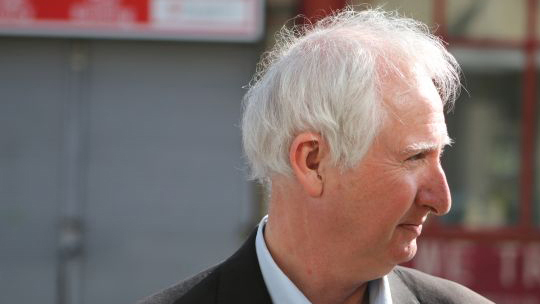
Julian Huppert: ‘I’m an internationalist. It’s why I went into politics’
Julian Huppert talks to Felix Peckham about what the Liberal Democrats have to offer students, from cannabis to Brexit, and defends his record as Cambridge’s MP between 2010 and 2015

Cambridge is a marginal seat, with Daniel Zeichner, the incumbent Labour MP, having a majority of just 599. For the Liberal Democrats, and their candidate Julian Huppert, who served as Cambridge’s MP between 2010 and 2015, this is one of their number one target seats. Huppert doesn’t disappoint and offers an eloquent and impassioned defence of his record as Cambridge’s representative, and of his vision of what a Liberal Democrat can offer Cambridge.
Huppert says a Liberal Democrat MP has “a huge amount” to offer students, and that “Brexit remains a key issue—students massively voted to stay in the EU because most students realise it’s about their future lives: prosperity, opportunity, peace, the environment, security and feel very let down by both the Tories and by Labour who voted to leave the EU and I think that’s going to cause catastrophic harm.”
“I’m an internationalist.” Huppert asserts, “It’s why I went into politics.”
Indeed Brexit is the predominant issue that the Liberal Democrats are fighting the forthcoming general election on. To say the least, Huppert is sceptical about the sort of deal that could be struck: “We have no idea for what the deal could look like. I don’t think people voted for leaving the single market, for abandoning freedom of movement and loosing all sorts of influence. The fact that the pro-Brexit people are so terrified of giving the people any further say proves that they’re worried that we’d win it. I think they know that the deal will be rubbish.”
“I’m an internationalist.” Huppert asserts, “It’s why I went into politics. Our place is in the European Union, working with our neighbours. I’d like the EU to be a much better place, but my view is certainly that we should be inside.”
Returning to the theme of student issues, he tells me “we’re also the only party picking up on issues that are important for students right now.”
“For example, we’re the only people who have talked a lot about mental health support. We’ve campaigned locally in Cambridge to get more help for students while they’re here, but also more broadly putting £1 billion extra into mental health support, because it has been frankly unacceptably poor.”
Controversially, Huppert tells me that the Liberal Democrats “have a very strong record for delivering for students.” I ask him to clarify how this sits with the infamous Liberal Democrat broken promise on tuition fees, which they trebled from £3,000 to £9,000 per annum, during their five year stint in coalition with the Conservatives.

“I opposed fees and always have done.” He explains, “Labour’s record on this is something that students should be extremely wary of. Labour introduced tuition fees; I campaigned against them. Labour then said they’d never increase them, they then did. We’ve seen Labour promise all sorts of things to students in Cambridge and never ever deliver on them. It really riles me. I led many of the protests against this. I was then elected on a promise that I would vote against any fee increase and I stuck to my promise. Daniel [Zeichner] himself was on record at one of the former student hustings explaining why he thought fees were essential. I don’t buy Labour’s costings of this; I think they’re just making it up as they go along.”
Having mentioned Daniel Zeichner, Huppert’s primary opponent, I ask him if he can draw any distinctions between their respective records as representatives for Cambridge. Huppert is quick to raise himself above the partisan fray: “I don’t like attacking opponents. That’s never been my style.”
Despite this rhetoric, he does offer a thinly-veiled dismissal of the incumbent’s record. “I think the big difference is that during five years, I actually got things done. I got things changed. I actually made a difference in all sorts of ways, and I haven’t seen him do that. What has he actually achieved? He’s caused a lot of harm by voting for the referendum on the EU—why he wanted to gamble the country’s future I remain unclear about.”
Having embarked upon the road of nitty-gritty accountability, I question Huppert on the more than 780 times he voted with the Conservatives during his five years in government—a statistic proudly displayed on Zeichner’s campaign literature.
“The tribal Labour types get very excited about that, but I think it’s really quite sad that they think the Tories voted for something that it must necessarily be evil. For example, I voted for same-sex marriage, so did quite a lot of Tories.”
This seems to easily dismiss some of the less-appetising bills that the Conservatives passed during that Parliament, so I ask Huppert if he is equally proud of voting for the introduction of the Bedroom Tax.
Huppert acquiesces, visibly upset: “I’m actually livid about that. I was lied to by Ian Duncan-Smith. We were promised that the way it would work would not affect some of the people that it has affected. Had I known the truth, had I not been lied to, I’d never have voted for it. I do absolutely regret that, but I’m still furious about being lied to.”
Finally, I question Huppert on the Liberal Democrat policy to legalise cannabis, a cause which he has particular championed. “This isn’t a sort of ‘hippy’ thing. This is about improving mental health and making people safer.” Huppert assures me.
“You can get fourteen years, in principle, for having a spliff. But people still have it—millions of people have had it. We’ve run a system for fifty years that has utterly failed. What it has done is given control to the criminals. They don’t care about the safety of it. What we’ve seen in particular is more harmful strains have come out. We need to regulate cannabis, so it’s safe and people know what they’re getting. Currently the only ID you need to get cannabis is a twenty quid note, depending on the prices.”
Huppert concludes by drawing on his own experience, or lack thereof: “We can make it much safer. I’ve never tried cannabis—sadly, boringly—and I don’t particularly want to.”

Meet the candidates
 Comment / Plastic pubs: the problem with Cambridge alehouses 5 January 2026
Comment / Plastic pubs: the problem with Cambridge alehouses 5 January 2026 News / Cambridge businesses concerned infrastructure delays will hurt growth5 January 2026
News / Cambridge businesses concerned infrastructure delays will hurt growth5 January 2026 News / Cambridge academics stand out in King’s 2026 Honours List2 January 2026
News / Cambridge academics stand out in King’s 2026 Honours List2 January 2026 News / AstraZeneca sues for £32 million over faulty construction at Cambridge Campus31 December 2025
News / AstraZeneca sues for £32 million over faulty construction at Cambridge Campus31 December 2025 Interviews / You don’t need to peak at Cambridge, says Robin Harding31 December 2025
Interviews / You don’t need to peak at Cambridge, says Robin Harding31 December 2025













